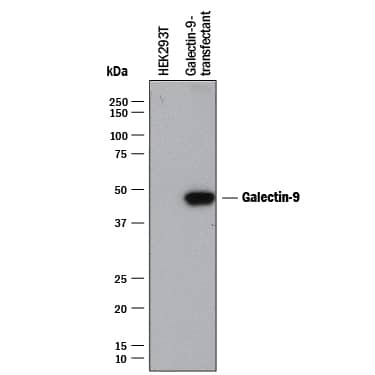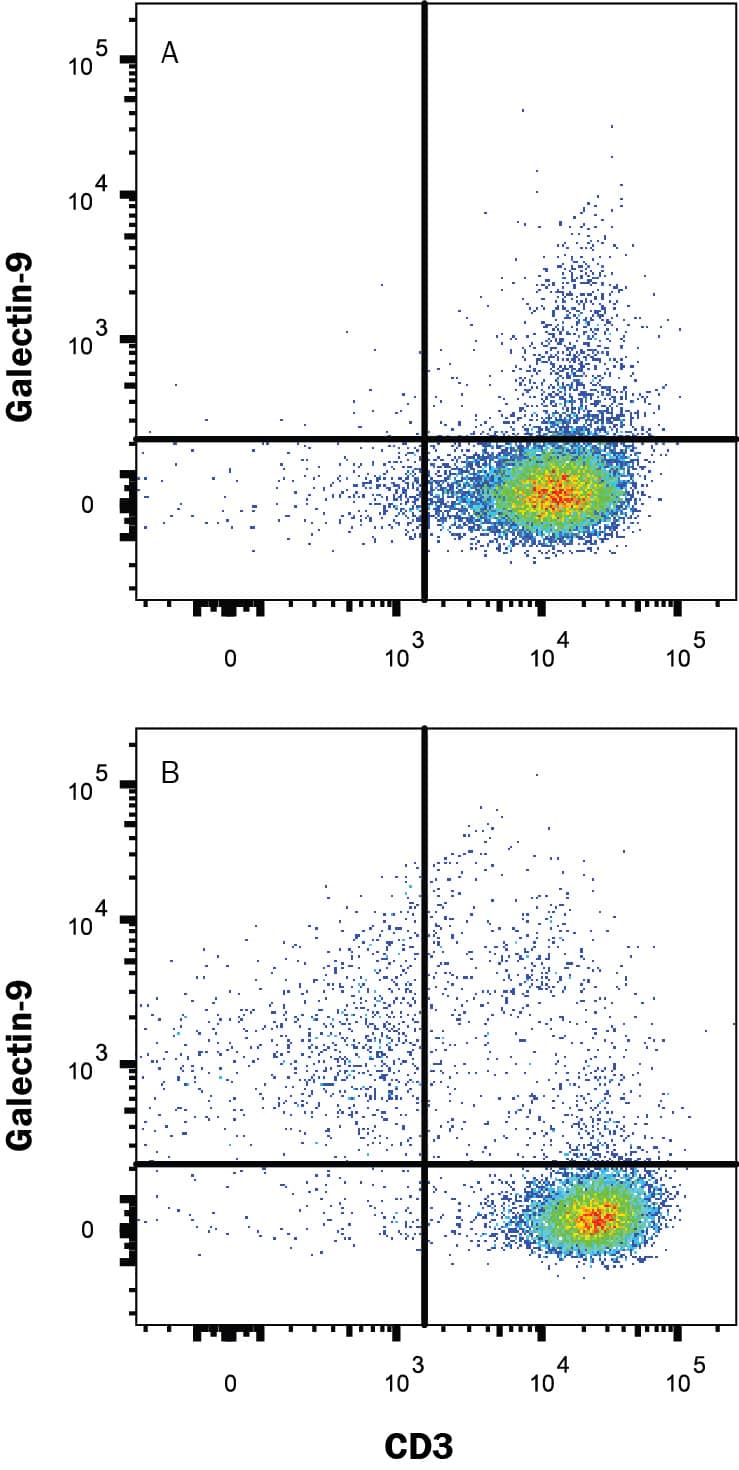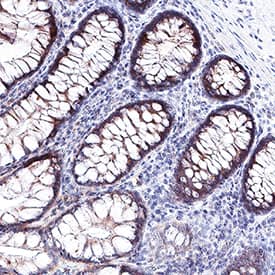Human Galectin-9 Antibody Summary
Ala2-Thr323
Accession # O00182
Applications
Please Note: Optimal dilutions should be determined by each laboratory for each application. General Protocols are available in the Technical Information section on our website.
Scientific Data
 View Larger
View Larger
Detection of Human Galectin‑9 by Western Blot. Western blot shows lysates of HEK293 human embryonic kidney cell line either mock transfected or transfected with human Galectin-9. PVDF membrane was probed with 2 µg/mL of Mouse Anti-Human Galectin-9 Monoclonal Antibody (Catalog # MAB20455) followed by HRP-conjugated Anti-Mouse IgG Secondary Antibody (Catalog # HAF018). A specific band was detected for Galectin-9 at approximately 45 kDa (as indicated). This experiment was conducted under reducing conditions and using Immunoblot Buffer Group 1.
 View Larger
View Larger
Detection of Galectin-9 in Human PBMCs by Flow Cytometry. Human peripheral blood mononuclear cells (PBMCs) either (A) treated with 5 ng/mL PHA for 2 days or (B) untreated, were stained with Mouse Anti-Human Galectin-9 Monoclonal Antibody (Catalog # MAB20455) followed by Allophycocyanin-conjugated Anti-Mouse IgG Secondary Antibody (Catalog # F0101B) and Mouse Anti-Human CD3 epsilon PE-conjugated Monoclonal Antibody (Catalog # FAB100P). Quadrant markers were set based on control antibody staining (Catalog # MAB003). View our protocol for Staining Membrane-associated Proteins.
 View Larger
View Larger
Galectin‑9 in Human Colon. Galectin-9 was detected in immersion fixed paraffin-embedded sections of human colon using Mouse Anti-Human Galectin-9 Monoclonal Antibody (Catalog # MAB20455) at 0.5 µg/mL for 1 hour at room temperature followed by incubation with the Anti-Mouse IgG VisUCyte™ HRP Polymer Antibody (Catalog # VC001). Before incubation with the primary antibody, tissue was subjected to heat-induced epitope retrieval using Antigen Retrieval Reagent-Basic (Catalog # CTS013). Tissue was stained using DAB (brown) and counterstained with hematoxylin (blue). Specific staining was localized to bile canaliculi. View our protocol for IHC Staining with VisUCyte HRP Polymer Detection Reagents.
Reconstitution Calculator
Preparation and Storage
- 12 months from date of receipt, -20 to -70 °C as supplied.
- 1 month, 2 to 8 °C under sterile conditions after reconstitution.
- 6 months, -20 to -70 °C under sterile conditions after reconstitution.
Background: Galectin-9
Galectins comprise a family of multifunctional carbohydrate-binding proteins with specificity for N‑acetyl-lactosamine-containing glycoproteins. At least 14 mammalian Galectins share structural similarities in their carbohydrate recognition domains (CRD), forming three groups: prototype (one CRD), tandem-repeat (two CRDs), and chimeric (one CRD, unique N‑terminus) (1, 2). Full length Galectin-9 is a widely expressed 39 kDa tandem-repeat Galectin that contains two CRDs connected by a linker region (3). Progressive deletion within the linker region generates a 36 kDa isoform, also known as Ecalectin or UAT, as well as a 35 kDa isoform (4). This recombinant protein corresponds to the Ecalectin isoform of human Galectin-9 and shares 70% and 73% aa sequence identity with the corresponding regions of mouse and rat Galectin-9, respectively. Galectin-9 exhibits a wide range of activities. All three isoforms function as eosinophil chemoattractants (5, 6). This activity is destroyed by thrombin-mediated cleavage within the linker region of the long isoform, although the Ecalectin isoform is resistant to thrombin (7). Galectin-9 binds to carbohydrate moieties of IgE, thereby preventing immune complex formation, mast cell degranulation, and asthmatic and cutaneous anaphylaxis reactions (8). Independent of its lectin properties, Galectin-9 induces the maturation of dendritic cells which promote Th1 polarization (9). Galectin-9 induces cellular apoptosis in part by direct binding to TIM-3 (10, 11). Its interaction with TIM-3 inhibits Th1 cell and CD8+ cytotoxic T cell responses and also promotes regulatory T cell differentiation and activity (11, 12). Galectin-9 suppresses tumor cell metastasis by interfering with the associations between hyaluronic acid and CD44 and between VCAM-1 and Integrin alpha 4 beta 1 (13). The Ecalectin isoform (UAT; urate transporter) can also be expressed as an integral membrane protein and mediate the cellular efflux of urate (14).
- Yang, R-Y. et al. (2008) Expert Rev. Mol. Med. 10:e17.
- Elola, M. T. et al. (2007) Cell. Mol. Life Sci. 64:1679.
- Tureci, O. et al. (1997) J. Biol. Chem. 272:6416.
- Chabot, S. et al. (2002) Glycobiology 12:111.
- Matsumoto, R. et al. (2002) J. Immunol. 168:1961.
- Sato, M. et al. (2002) Glycobiology 12:191.
- Nishi, N. et al. (2006) Glycobiology 16:15C.
- Niki, T. et al. (2009) J. Biol. Chem. 284:32344.
- Dai, S.-Y. et al. (2005) J. Immunol. 175:2974.
- Seki, M. et al. (2007) Arthritis Rheum. 56:3968.
- Zhu, C. et al. (2005) Nat. Immunol. 6:1245.
- Sehrawat, S. et al. (2010) PloS Pathogens 6:e1000882.
- Nobumoto, A. et al. (2008) Glycobiology 18:735.
- Leal-Pinto, E. et al. (2002) Am. J. Physiol. Renal Physiol. 283:F150.
Product Datasheets
FAQs
No product specific FAQs exist for this product, however you may
View all Antibody FAQsReviews for Human Galectin-9 Antibody
There are currently no reviews for this product. Be the first to review Human Galectin-9 Antibody and earn rewards!
Have you used Human Galectin-9 Antibody?
Submit a review and receive an Amazon gift card.
$25/€18/£15/$25CAN/¥75 Yuan/¥2500 Yen for a review with an image
$10/€7/£6/$10 CAD/¥70 Yuan/¥1110 Yen for a review without an image
